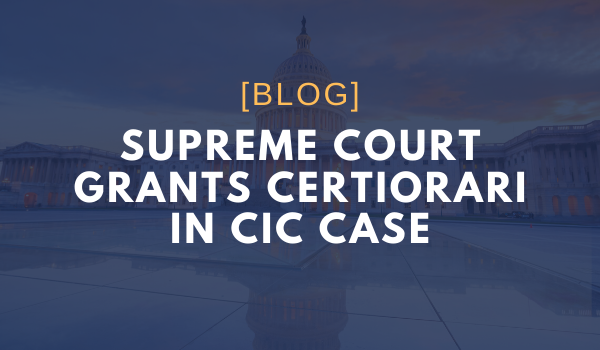On March 21, 2022, the United States District Court for the Eastern District of Tennessee struck a major blow against the practice of the Internal Revenue Service of harassing taxpayers who engage in transactions that the IRS simply does not like.
The name of the case is CIC Services, LLC v Internal Revenue Service, Department of Treasury and the United States of America, a case that went from the District Court to the Supreme Court and back to the District Court.
IRS NOTICE 2016-66
The subject matter of the case is IRS Notice 2016-66, which was issued in November, 2016. In Notice 2016-66, the IRS designated certain “micro-captive transactions” as “transactions of interest”. In accordance with that designation, taxpayers who participated in a “micro-captive transaction” became obligated to make certain disclosures to the IRS upon pain of both civil and criminal penalty.
PROCEDURAL HISTORY
Shortly after Notice 2016-66 was issued, the plaintiff in this case, CIC Services, filed a lawsuit against the IRS seeking to enjoin the enforcement of Notice 2016-66. CIC Services claimed that the IRS had failed to follow the requirements of the Administrative Procedure Act (APA) in issuing the Notice and that, as a result, it should be declared null and void.
In its first pass at the case, the District Court dismissed the complaint on the ground that the lawsuit was barred by the Anti-Injunction Act (AIA). The AIA prohibits a court from enjoining the tax collection efforts of the IRS. In effect, the AIA forecloses a pre-collection attack on a revenue provision and requires a taxpayer to pay the tax and sue for a refund.
CIC Services appealed the decision of the District Court to the United States Court of Appeals for the Sixth Circuit, which upheld the decision of the District Court – again, on the ground that the lawsuit was barred by the AIA. CIC Services then filed an application for a Writ of Certiorari with the Supreme Court.
In a surprise to many observers, the Supreme Court granted the plaintiff’s application for a Writ of Certiorari. And, after oral argument, in a decision, about which we have previously written, the Supreme Court ruled that the AIA did not prohibit the plaintiff’s lawsuit. The case was remanded to the District Court for further proceedings. The District Court’s Memorandum Opinion entered on March 21, 2022, is the result of those further proceedings.
WHAT IS THE ADMINISTRATIVE PROCEDURE ACT?
In short, the Administrative Procedure Act is the federal statute that governs the way in which a federal regulatory agency, like the IRS, can issue regulations and impose legal obligations on taxpayers. Under the APA, an agency is required to publish its proposed regulation or rule, provide an opportunity for the public to comment and then respond to the comments that it receives before issuing a final, binding regulation.
These requirements apply to what are called “legislative rules”. A “legislative rule” has the “force and effect” of law and imposes new rights or obligations on the public. On the other hand, an “interpretive rule”, which simply interprets a statute enacted by Congress and does not create new rights or obligations, is not subject to the notice-and-comment requirement of the APA.
In this case, there was no dispute that the IRS had not provided notice and comment before Notice 2016-66 was issued. The IRS made two arguments in claiming that it was not required to adhere to the APA’s notice-and-comment requirement. First, it said that Notice 2016-66 was not a legislative rule, but an interpretive rule, and that notice and comment were not required. In the alternative, it claimed that, even if Notice 2016-66 were a legislative rule, Congress had delegated authority to the IRS to issue legislative rules without notice and comment.
THE IRS VIOLATED THE APA
If this case sounds familiar, that’s because it is. On March 3, 2022, the United States Court of Appeals for the Sixth Circuit issued its opinion in Mann Construction, Inc., et al v United States of America. In that case, the plaintiffs had challenged IRS Notice 2007-83, which had designated certain welfare benefit plans funded with cash-value life insurance as listed transactions. The plaintiffs claimed that Notice 2007-83 had been issued without notice and comment, as required by the APA and that, as a result, was invalid.
The Sixth Circuit agreed with the plaintiffs in the Mann case. It found that Notice 2007-83 was a legislative rule because it imposed obligations on taxpayers that did not exist before the Notice was issued. Further, it found that Congress had not exempted the IRS from the notice-and-comment requirement of the APA. As a result, it vacated Notice 2007-83.
The CIC Services cased was brought in the United States District Court for the Eastern District of Tennessee. Tennessee is in the Sixth Circuit. As a result, the District Court in the CIC Services case was bound by the Sixth Circuit’s decision in the Mann Construction case. This made for an easy decision in this case. The District Court found that:
. . . Notice 2016-66 is a legislative rule that is invalid because the IRS failed to observe notice-and-comment procedures required by the APA.
ARBITRARY AND CAPRICIOUS
Here is where this case becomes really interesting. In addition to claiming that the IRS had violated the notice-and-comment requirement of the APA, CIC Services also claimed that Notice 2016-66 was “arbitrary and capricious”. A court can set aside agency action if it finds that the action is arbitrary and capricious or an abuse of discretion. (7 U.S.C. section 706(2)(A)). Agency action is arbitrary and capricious if it is not based on facts and sound reasoning.
In determining whether an agency action is arbitrary and capricious under the APA, courts determine only whether the [agency] examined ‘the relevant data’ and articulated ‘a satisfactory explanation’ for [its] decision, including a rational connection between the facts found and the choice made.
This is not a very difficult standard for an agency to satisfy. Which is why it is so surprising and all the more impactful that the District Court in CIC Services found that Notice 2016-66 was arbitrary and capricious.
When reviewing agency action, a court is limited to reviewing the agency’s administrative record. That record must include sufficient facts and a reasoned decision based on those facts to support the agency action. In this case, the District Court found that the administrative record did not contain sufficient facts or a reasoned basis to support Notice 2016-66.
The District Court acknowledged that the IRS has the authority to require taxpayers to provide information about transactions that may have the potential for tax avoidance. However, the administrative record contained no facts from which the IRS could reasonably determine that micro-captive transactions have the potential for tax avoidance.
. . . under the APA, the Court must review the administrative record to determine whether the IRS “examined the relevant data” and “articulated a satisfactory explanation” for its decision to designate micro-captive transactions as a “transaction of interest” based on the potential for tax avoidance or evasion.
In this case, the administrative record fails to include relevant data and facts supporting the IRS’s decision to designate micro-captive arrangements as transactions of interest, and, thus, reportable transactions.
The Notice simply states that the IRS is aware of microcaptive transactions and “believes” these transactions have the potential for tax avoidance or evasion. (Id.) While the Notice goes on to describe these transactions, it does not identify any facts or data supporting its belief.
In other words, the District Court found that the IRS could not support its claim that micro-captive transactions have the potential for tax avoidance. Instead, it found that the IRS had essentially designated micro-captive transactions as transactions of interest simply because it does not like them and wants to restrain their use.
The administrative record in this case simply does not include underlying facts and data showing that micro-captive insurance arrangements have a potential for tax avoidance or evasion. As a result, the Notice must also be set aside as agency action that is arbitrary and capricious.
NOTICE 2016-66 IS INVALID
Because the IRS had violated the APA when it issued Notice 2016-66, the District Court found that the proper remedy was to vacate the Notice in its entirety and enjoin its enforcement. In addition, in a surprising development, the District Court determined that the IRS had received information and documents from taxpayers and material advisors under the Notice, which it was not entitled to receive. As a result, the District Court ordered the IRS to return to taxpayers and material advisors the information and documents that it had improperly collected under the Notice.
This is obviously a huge loss for the IRS. It casts a shadow on its persecution of the captive insurance industry. However, this may not be the end of the story. The IRS has the right to appeal to the Sixth Circuit and, if the decision of the District Court is affirmed in the Sixth Circuit, to ask the Supreme Court to intervene.
It is for this reason that we are not recommending that any taxpayer or material advisor involved in a micro-captive transaction no longer file the appropriate disclosures with the IRS. All taxpayers and material advisors should consult with their independent legal and tax advisors before choosing to not file.
However, whatever decision any particular taxpayer or material advisor makes, this case is another chink in the armor of the IRS.



